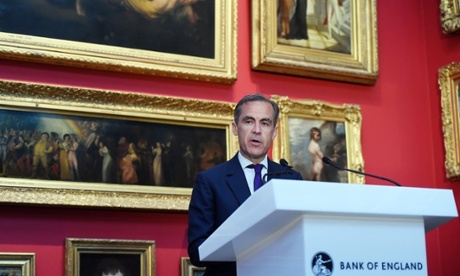
Mark Carney is to warn City traders that they should face up to 10 years in jail for rigging and abusing markets as he pledged to end “the age of irresponsibility” that has gripped the financial sector.
The Bank of England governor acknowledged the economic harm caused by what he described as the “ethical drift” that took hold in the fixed income, currency and commodities (FICC) markets before the financial crisis.
About $150bn (£96bn) worth of fines have been imposed on major banks since 2008, depriving the real economy of $3tn of credit and potentially holding back the global economy, he said.
Carney will use his annual Mansion House speech to top City bankers on Wednesday night to concede that the Bank under his predecessor, Lord King, made its own mistakes during the crisis, failing to spot the risk building up in the system and failing to pump enough liquidity into crippled financial markets. The bank’s own arcane governance “weakened the social licence of markets”, he said.
Setting out four elements of a new approach to those financial markets which have not been directly regulated by the Bank or the Financial Conduct Authority, Carney will say a global approach to cleaning up market practices is necessary.
He is expected to say: “For the best of the industry this won’t be new. This is just how you run your business. But for others who free-ride on your reputations: the age of irresponsibility is over.”
The FICC markets accounted for $117bn of revenue generated by the big banks in 2013. They set the exchange rates used by holidaymakers and the interest rates at which governments, companies and householders borrow. Carney will set out four main measures:
- Holding individuals to account, with new standards and qualifications.
- Setting up a market standards board to draw up standards and police them.
- Extending the market abuse regime which applies to the stock market to every major fixed-income and currency market, and bringing criminal sanctions in line with those for fraud, with 10 years imprisonment rather than seven.
- A global code for foreign exchange markets and additional work “to improve the alignment between remuneration and conduct risk across the globe”.
The wave of fines for forex and Libor rigging has undermined public trust and threatened financial stability, he will say. Mistrust between market participants had raised borrowing costs, meaning companies had held back investment and people hesitated to move home. “These effects are not trivial, and they have reduced the dynamism of our economy in the post-crisis years,” he will say.
George Osborne, the chancellor, is also scheduled to speak at the Mansion House amid speculation he will ease some of the taxes imposed on the banking sector since the crisis. But Osborne will also say: “The governor and I agree: individuals who fraudulently manipulate markets and commit financial crime should be treated like the criminals they are – and they will be.
“The public rightly asks why it is after so many scandals, and such cost to the country, so few individuals have faced punishment in the courts.”
Carney will announce that the Bank – including himself – will be subjected to the new senior management regime which comes into force in March 2016 and is intended to ensure the buck stops with top managers. This regime will now be extended from its original target of top bankers to tens of thousands of fund managers, traders and interdealer brokers.
“We need real markets for sustainable prosperity. Not markets that collapse when there is a shock from abroad. Not markets where transactions occur in chatrooms. Not markets where no one appears accountable for anything,” Carney will say.
A new code of conduct for the Bank’s staff – some of whom have been drawn into the Libor and forex scandals – is also to be launched on Wednesday.
In a damning indictment of the previous regime, Carney will say that markets left themselves open to abuse as a result of the way they operated and by having pay deals “skewed, with pay packages stressing short-term returns over long-term value and good conduct”.
The bank governor will point to “personal accountability that was lacking, with a culture of impunity developing in parts of the markets”.
The previous approach to overseeing these FICC markets of informal codes had failed. “Unethical behaviour went unchecked, proliferated and eventually became the norm. Too many participants neither felt responsible for the system nor recognised the full impact of their actions. For too many, the City stopped at its gates, although its influence extended far beyond.”
Carney is announcing the outcome of a year-long review commissioned by Osborne at last year’s Mansion House speech in the wake of the forex and Libor scandals. Led by deputy governor Nemat Shafik, the fair and efficient markets review will now be followed by an open forum in the autumn at which senior foreign exchange dealers, bond traders and commodity traders will be expected to tackle the behaviour for which their employers have been fined.
Libor-rigging has already become a criminal offence, punishable by up to seven years in jail, following the scandal caused by the 2012 fine imposed on Barclays. The rigging of other markets, such as gold and currencies, has since been added.

